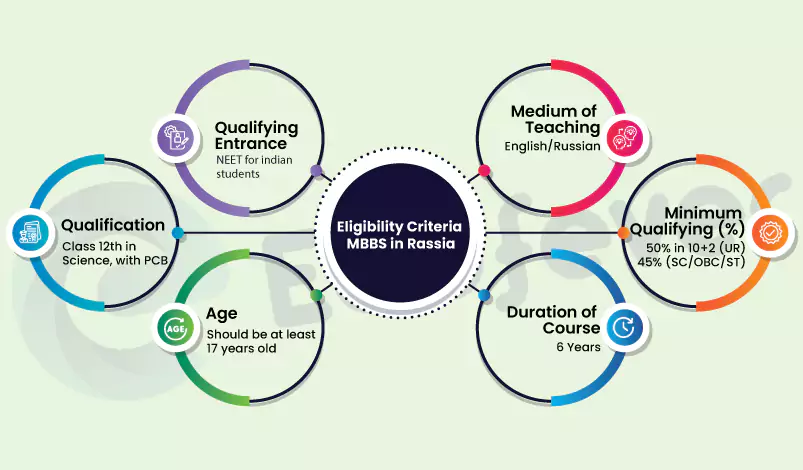Are you considering pursuing an MBBS in Russia? It’s no surprise that Russia is becoming an increasingly popular destination for medical education. However, with so much information floating around, how do you know what’s true? In this article, we uncover the real facts and tell the truth about MBBS in Russia. We’ll give you an honest view of studying medicine in Russia, covering education quality, university reputation, and addressing common myths and facts about studying MBBS in Russia for Indian Students.
Come with us as we explore the details of studying MBBS in Russia: the admission process, tuition fees, and living conditions for international students. We’ll also cover practical aspects such as internship opportunities, language requirements, and the global recognition of Russian medical degrees.
If you’re thinking about starting this exciting educational journey, stay tuned. This article will provide you with the information you need to decide if pursuing your dream of becoming a doctor in Russia is right for you. Discover the truth about MBBS in Russia and see if this path aligns with your aspirations and goals.
[Page Index]
Quick Facts
Before reading the complete information about The truth about MBBS in Russia in-depth, let’s look at Quick Facts about Russia.
| Particulars | Description |
|---|---|
| Courses Offered | Bachelor of Medicine (MBBS) |
| Courses Duration | 6 Years (English Medium) 7 Year (Russian Medium) |
| Basic Eligibility | 50% in 10+2 (UR) 45% (SC/OBC/ST) |
| Entrance Exam | NEET Qualified (Only) |
| Medium of Teaching | English |
| Intake for MBBS in Russia | September |
| Universities Recognition | NMC & WHO |
| MBBS Fees in Russia | 4000 – 7000 USD Per Annum |
| Cost of Living in Russia | 200-260 USD per month |
Benefits of Pursuing MBBS in Russia
1. Quality Education
Russia is now a top choice for international students pursuing an MBBS (Bachelor of Medicine, Bachelor of Surgery) degree. Here are the key reasons why aspiring medical students should consider studying MBBS in Russia.
Russian medical universities are well-known for their high-quality education. Many are recognized globally by organizations like the World Health Organization (WHO) and the National Medical Commission (NMC). The curriculum emphasizes both theory and practical training through clinical rotations.
2. Affordable Tuition Fees
Tuition fees in Russia are generally lower compared to Western countries, making it a cost-effective option for quality education.
3. No Entrance Exams
Admission to Russian medical universities often requires meeting academic criteria without rigorous entrance exams, making the process straightforward.
4. Internship Opportunities
MBBS programs in Russia include a mandatory internship year in hospitals and clinics, providing valuable hands-on experience.
5. English-Language Programs
Many universities offer MBBS programs in English, removing language barriers for international students and enhancing learning.
6. Cultural Exposure
Living in Russia offers a rich cultural experience, allowing students to interact with diverse communities and broaden their cultural understanding.

Accreditation and Recognition of Russian Medical Universities
- Ministry of Education, Russia.
- ECFMG (Educational Commission for Foreign Medical Graduates)
- WFME (World Federation for Medical Education)
- FAIMER (The Foundation for Advancement of International Medical Education and Research)
- NMC (National Medical Commission)
- WHO (World Health Organization)
Cost of studying MBBS in Russia
Studying MBBS in Russia is cheaper than in many other countries, making it a great choice for students from different economic backgrounds who may not afford medical studies in more expensive places.
The MBBS tuition fees at Russian medical universities vary from 2,00,000 to 5,00,000 Russian Rubles per year (equivalent to 2 lakh to 5 lakh Indian Rupees), depending on the university. Below we mention some cheapest medical colleges in Russia.
| S.No | College Name | Fees per Annum |
| 1. | Chuvash State Medical University | USD: $ 2800/- INR: Rs. 244,434/- |
| 2. | Kemerovo State Medical University | USD: $ 2,733/- INR: Rs. 2,26,800/- |
| 3. | Bashkir State Medical University | USD: $ 5,390/- INR: Rs. 460,500/- |
| 4. | Kazan Federal University Russia | USD: $ 5,949/- INR: Rs. 4,93,740/- |
| 5. | Kursk State Medical University | USD: $ 6,080/- INR: Rs. 5,04,640/- |
Besides tuition fees, living costs in Russia are lower than in many other countries. Rent, food, and other essentials are generally more affordable, which helps students manage their budgets better. This is especially advantageous for international students with limited financial resources.
Additionally, the Russian government offers scholarships and financial aid to international students. These can cover part or all of the tuition fees and provide money for living expenses. These supports make studying MBBS in Russia easier for students who qualify.
Admission process 2025-26
Getting into MBBS programs in Russia is straightforward for international students, with clear requirements and guidelines. If you want to be Admitted to Russian University, you must qualify for the National Eligibility Entrance Exam for Indian students.
Eligibility Criteria
If you want to study MBBS in Russia, check the eligibility below.
| Age | Your age should be at least 17 years old on or before 31st December of the admission year. *No Upper Age Limit. |
| Qualification | Class 12th in Science, with PCB and English subjects from a board recognized by the authorities in India. |
| Minimum Qualifying (%) | 50% in 10+2 (UR) 45% (SC/OBC/ST) |
| Qualifying Entrance | NEET (for Indian Students) |

Curriculum and Teaching Methods
Russian medical universities offer a thorough 6-year MBBS program, with 5 years of theoretical and practical training followed by a one-year internship. The curriculum covers various medical subjects like anatomy, physiology, pathology, pharmacology, and clinical medicine.
A key feature is the emphasis on practical, hands-on learning in clinical settings. This approach helps students build essential skills and confidence for their medical careers.
Teaching methods combine traditional lectures and seminars with modern lab sessions, simulations, and case studies. Students also have opportunities for research projects and clinical rotations to enhance their practical experience.
Language Barrier and Support for International Students
One concern for international students pursuing an MBBS in Russia is the language barrier, as most programs are taught in Russian. To address this, many Russian medical universities offer preparatory language courses lasting 6-12 months to help students learn Russian before starting their MBBS program. Some universities also offer MBBS programs in English for non-Russian-speaking students.
Additionally, Russian medical universities provide various support services for international students, such as help with visas, accommodation, and access to healthcare. Many institutions have dedicated offices to assist international students throughout their studies.
Safety and Living Conditions in Russia
When choosing an MBBS program in Russia, it’s essential to consider safety and living conditions to ensure a secure and comfortable stay. This guide covers the general safety in major cities, the types of accommodations available, the cost of living, and the importance of conducting thorough research.
- Safety: Major cities like Moscow and St. Petersburg are generally safe due to a strong police presence and good infrastructure.
- Living Conditions: Many medical universities provide on-campus housing with essential amenities, while affordable off-campus housing options are available in nearby neighborhoods.
- Cost of Living: The cost of living in Russia is lower compared to many Western countries, making it easier for students to live comfortably.
- Research: Prospective students should research specific living conditions and safety measures at their chosen universities to ensure a safe and comfortable experience during MBBS studies in Russia.
Career Prospects after Completing MBBS in Russia
Completing an MBBS degree in Russia opens many opportunities for international students both within Russia and globally.
In Russia, graduates are highly sought after by healthcare institutions, hospitals, and private clinics due to their rigorous education and practical training. Russian medical degrees are recognized by international organizations like the WHO and WFME, allowing graduates to practice medicine worldwide, including in Europe, North America, and Asia.
Many students stay in Russia for residency or further specialization, benefiting from the country’s advanced healthcare system and professional growth opportunities. Alternatively, graduates can return to their home countries, where their Russian medical degrees are respected, and contribute to their local healthcare systems.
Conclusion
In conclusion, pursuing an MBBS in Russia is a great choice for aspiring medical students. Russian medical education is high-quality and affordable, with degrees recognized globally. This opens diverse career opportunities worldwide.
While challenges like the language barrier and cultural adjustment exist, Russian medical universities offer support to help international students succeed.
This article aims to provide a clear understanding of the truth about MBBS in Russia. As you pursue a career in healthcare, research and evaluate Russian MBBS programs to see if they align with your academic and career goals.


